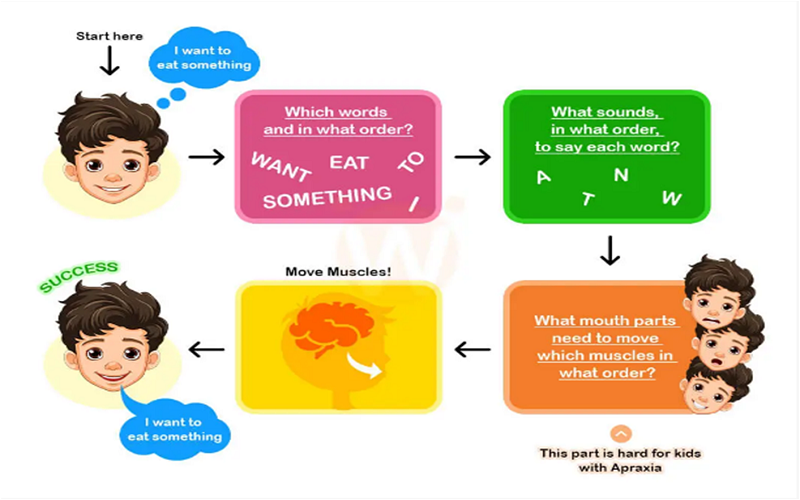Did you know that 1-2 children out of every 1,000 have Childhood Apraxia Of Speech (CAS)?
For parents, one of the most thrilling life events is when their child says their first words. However, in certain kids, the brain has problems communicating with the mouth muscles clearly about how to move. These kids suffer from Childhood Apraxia of Speech, a motor speech disorder. Males are more likely than females to have the disease.
If a kid is not speaking as many words as they should, parents may begin to notice symptoms of Childhood Apraxia of Speech. Let’s discuss the typical symptoms and indicators of CAS in more detail, as well as ways to help kids with the condition become more verbally expressive.
What Is Childhood Apraxia Of Speech (CAS)?
Speech is difficult with childhood apraxia of speech. It is also sometimes known as developmental verbal dyspraxia, a motor speech condition. Learning to pronounce words and sounds more clearly might take a lot of practice. In contrast to other speech disorders that may result from developmental delays or muscular weakness, the cause of CAS is a brain malfunction that impairs the brain’s ability to organize and coordinate the exact motions required for speaking. This indicates that although children with CAS are aware of what they want to say, their brains have difficulty sending the appropriate signals to their speech muscles.

Source:mywellnesshub.in
CAS differs from other speech disorders due to its unique features. This can take many different forms in kids with CAS. They may find it difficult to construct whole phrases or have a little vocabulary. They might speak in a style that is hard to comprehend or they could not always pronounce words consistently. This condition is characterized by the child’s inconsistency, which can be upsetting to both them and their listeners.
What Are The Causes Of Childhood Apraxia Of Speech?
Most of the time, nobody knows. However, there are instances in which a speech impairment is linked to a pre-existing neurological or genetic condition, such as:
- Traumatic brain injury
- Stroke
- Epilepsy
- Chromosomal abnormalities
- Cerebral Palsy
- Autism
What Are The Signs And Symptoms Of Childhood Apraxia Of Speech?
As educators with B.Ed. in Special Educational Needs, you need to look out for these symptoms of CAS:
- Numerous errors while making sounds
- Inconsistencies in pronouncing certain words
- Trouble in pronouncing longer words
- Groping movements or physical struggle during talking
- Using detailed gestures while saying a few words
- Can spontaneously make sounds or words but has trouble imitating them
- Has limited or distorted vowels
Parents may notice early warning signs of childhood autism spectrum disorders (CAS) in their kids if they see that their child is not talking at the appropriate age or has not begun speaking at all. Parents can also keep an eye out for symptoms of CAS if their infant isn’t babbling.
Diagnosis Of Childhood Apraxia
Childhood Apraxia of Speech (CAS) diagnosis is a complex procedure including knowledge of speech development issues, patience, and experience. Here are a few ways to do so:
Comprehensive Evaluation
A speech-language pathologist (SLP) will first thoroughly assess a child’s speech and language abilities to diagnose CAS. A range of tests are usually used in this examination to look at the child’s capacity to make sounds, words, and phrases. The SLP searches for telltale indicators of CAS, including patchy speech, difficulties transitioning smoothly between sounds or syllables, and restricted vocalizations.
Unlike other illnesses, CAS cannot be definitively diagnosed by a single test. Rather, to obtain a comprehensive picture of the child’s speech ability, the SLP combines observation, parent interviews, and targeted speech activities. Additionally, they could evaluate the child’s oral-motor skills, searching for indications of muscular weakness or coordination issues that might impact the child’s ability to speak.
Early Intervention
For several reasons, it is essential to identify CAS early. First of all, it makes it possible to start focused speech therapy interventions when a kid is still developing. There is a greater likelihood of improving speech and language results the earlier therapy is started.
In addition to promoting the child’s general growth and well-being, early intervention can assist in addressing the possible social and emotional effects of CAS.
Specialized Speech Therapists
To diagnose and treat CAS, specialized speech therapists are essential. They can differentiate CAS from other speech disorders that share similar symptoms because of their experience in speech and language development. This difference is crucial since treatment strategies for CAS might vary greatly from those for other illnesses.
SLPs with expertise in CAS are also skilled in developing individualized therapy programs that cater to the particular requirements of every kid. They use a variety of therapy approaches to help with speech planning and production, including tactics to increase speech rhythm and fluency, the use of tactile and visual cues, and repeated repetition of speech sounds.
Final Takeaway
It’s critical to recognize Childhood Apraxia of Speech (CAS) and take appropriate action early on. It facilitates the development of kids’ speaking and communication skills. Children may make tremendous strides toward discovering their voices and improving their self-expression with the correct support. Parents must understand that they are not traveling this path alone. Therefore, a B.Ed. in Special Education course can help both teachers and parents understand exactly how to understand and cater to the student’s needs

